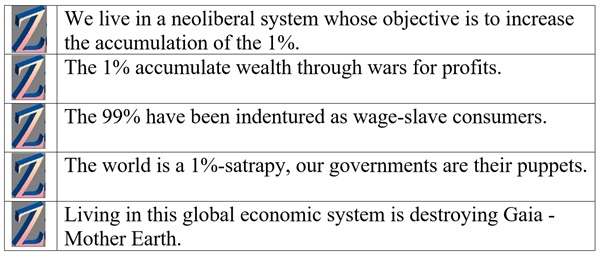|
|
 The path of compassion, insight and creativity - the struggle for GAIA and against the 1%-satrapy of war and wage-slavery.
The path of compassion, insight and creativity - the struggle for GAIA and against the 1%-satrapy of war and wage-slavery. |
| |
| This is a continuation of my zandtao blog. |
|
Email Zandtao:- |
|
|
|
 Zandtao Blog Links page Zandtao Blog Links page |
|
History Bias I have never been a fan of history, it is far too subjective. Whilst I am a big fan of genuine subjective understanding based on insight, subjectivity in history shows itself by people supporting the status quo – fellow “reputed” academics. Or even worse supporting establishment bias such as eurocentricity. Before I get into the serious issue of eurocentricity I remember a recent dialogue with an erstwhile history colleague. What underlay his analysis was a fierce English nationalism. This was not a nationalism exemplified by the violence of the British National party, but of course any form of nationalism gives intellectual credence to the ignorance that creates such racist violence. This English nationalism took the form of English people being good (some English people are good some are bad), so it was necessary for him to justify crimes committed by English governments and he blamed it on the Scots. I remember watching as a huge essay spewed across facebook in which reference after reference justified this skewed position. This was a trained historian, a history teacher, well used to having his views questioned, so he used the methodology of historical research to justify a ludicrous position. I made no attempt to counter his position because I knew the position was untenable, and I also remembered him well enough to know that he would have a Ph D of references to support this illusion. This of course is a crass example of the misuse of historical methodology and research, and because he is an individual of limited social influence his illusion does not matter. But there are historical positions which have had social influence where the illusions have mattered. As discussed in this Wikipedia page, scientific racism has always been around when the colonial empire was expanding. These are all nonsensical theories whether expounded by noted people (such as Darwin) or not; if an institute supports such racism as science there will be found reasons of bias which dominate that institute. Nature knows, Gaia knows, racism and racial difference is a matter of culture and conditioning. When an institute puts forward racism then you know there is bias, and you have to question the integrity of the institute. When I see institutes propounding racism under the guise of science, I question their integrity; and as with all contemporary dubious science I look at the funding primarily as the source of the knowledge. However historically scientific racism, developing from 1600 onwards according to wiki, was simply supporting the colonial empire. I remember a nineteenth century theory, which had some academic credence at that time, African brains were smaller than European brains. This justified the missionary vanguard to charge ahead demanding that heathens get educated by the caring white man. Whilst I was never taught such grossness, my own history schooling supported the superiority of the white man – the Eurocentric view. If I were designing a history curriculum it would stress the following:- These points are substantiated in various ways by many authoritative historians, it is only cultural prejudice that does not see them as unbiased. I would also add a moral aspect to history asking “what are moral components of civilised achievement?” This is a sufficient basis for me to recognise that there is a substantial cultural bias in academic history. One might argue that if we look at our history books the Eurocentric view is prevalent. Eastern written knowledge has been long established but they are not written in English. Secondly in terms of African history much of her own history is oral, they did not write it down. The first famed library was established by the Greeks in Alexandria, but African knowledge and history was not transferred to print. As a maths teacher I remember the use by African farmers of a rope with 13 knots each a meter apart being used by farmers to form a rectangular corner in a field – long before Pythagoras made theorems. And to be fair to Pythagoras I believe he attributed his wisdom to African sources. When I was doing my anti-racist work 30 years ago my knowledge was much more informed (see Young Journal for state of awareness), and I am sure there have been many more contributions advancing the above position since then – even though funded racisms have developed at the same time. But what I want to make clear is that the subjective nature of history has already demonstrated a cultural bias – a Eurocentric bias. And my reason for making this point is that misrepresentation of Africa has not been the only Eurocentric approach. I have been recently putting forward the position that we need an Indigenous-led green movement so that we can return to a civilised position of harmony with nature – with Gaia. Most of this awareness strategy so far has been to focus on the wisdom and activities of the Native Americans, but theirs is not the only indigenous wisdom I seek leadership from. An apparently historical reasonable counter-argument would be to look at these indigenous peoples, look at how uncivilised they are, why should we be led by them? And this is why I want to point to history bias. Eurocentric history has belittled the advances of African civilisations, but eurocentrism has also belittled the advances of indigenous Americans. History is only now “discovering” – choosing to “discover” – the advanced civilisations of the Americas. Far from the only book I am in the process of looking at Charles Mann’s Book "1491 - New Revelations of Americans before Columbus" in which he charters the developed civilisations of the Americas. There has been significant research on how the Indigenous peoples of North America have been underdeveloped, it has been a systemic genocidal policy. Suffice it to say that this policy has misdirected and created the superficial illusion of Native Americans as ignorant savages. When we look at other indigenous peoples similar characterisations are presented. In Australia the indigenous wisdom of the aborigines is belittled, the peoples are described as worthless, lazy and drunk, similarly the Maoris in New Zealand. These common characterisations of peoples whom Europeans, mainly British, have displaced when invading their lands for resources are indications of the racism that continues to dominate Eurocentric historical views. Charles Mann has indicated a deeper Indigenous American history. He suggest that as many as 80-100 million people were wiped out through viral contact with Europeans. That must have had a similar impact on the civilisations of these peoples as slavery did in Africa. There are suggestions that Olmec civilisation stemmed from Africa - Dr Ivan van Sertima, I make no comment on that veracity just to say that my confidence in the acumen of historical method does not dismiss this. The primary thrust of academic analysis is to support the British invasion of America, and the subsequent establishment of a white government through slavery of Africans and exploitation of migrant workers; superficial descriptions of ignorant savages raping white women is sufficient academia for the 1%-satrapy and their conditioning:-  I, however, am not trying to inform about the displacement of indigenous civilisations, there are far, far greater authorities on this. I want to read about the history of indigenous wisdom. Whilst my compassion goes to any peoples who have suffered under Euro-genocide, what I am concerned with is the path and the preservation of wisdom. This is because my primary concern is the destruction of Gaia, shouldn’t that be the concern of all people? In seeking to preserve this wisdom it is difficult to study. Basil’s caring history of Africa was not a history of Indigenous wisdom, it was a measure of African civilisations using the benchmark of European greed. Wangari Maathai’s work with the peoples of Kenya is work that provides hope for Gaia and the continent, not the expensive Basilica in the Ivory Coast or the famed gold of the Mali kingdoms in Timbuktu. I want a historic focus on wisdom that is connected to Gaia, and will be looking out for this. History bias will of course not show this in mainstream. This is a huge topic, I have no idea how far I will get with it.
| |||
| Books:- Treatise, Pathtivism Manual, Wai Zandtao Scifi, Matriellez Education. Blogs:- Matriellez, Mandtao. |